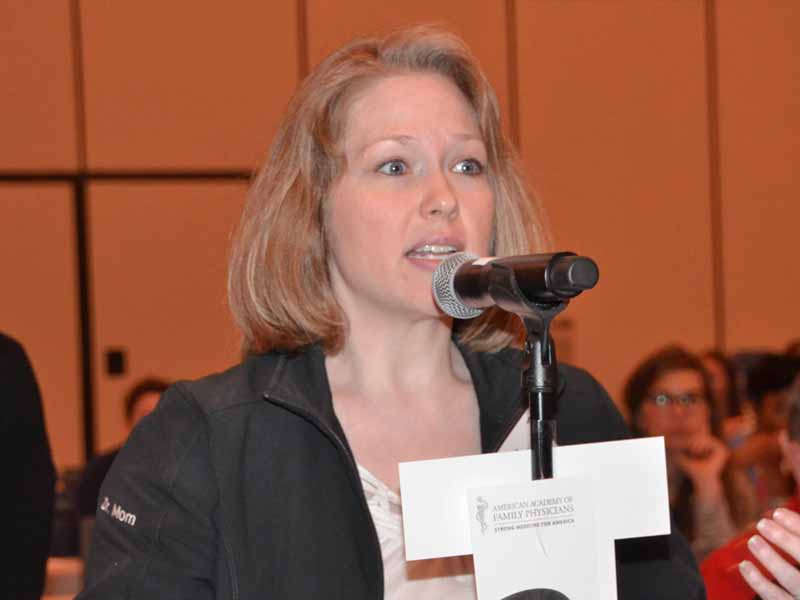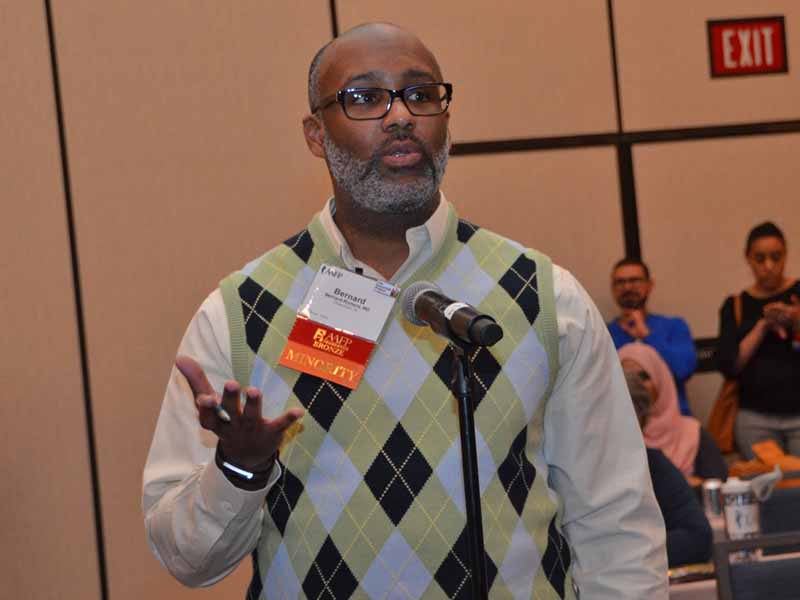FPs Hammer Out Practice-related Measures for AAFP to Take Up
May 01, 2019 04:08 pm Sheri Porter Kansas City, Mo. – Above all else, family physicians love taking care of their patients. And that's why a large group of AAFP members gathered here recently to attend the AAFP's National Conference of Constituency Leaders, where they worked together to make their specialty stronger.
From April 25-27, family physicians represented themselves or one of five constituency groups recognized at this conference: women, minorities, new physicians, international medical graduates, and LGBT physicians and those who support LGBT issues.
During the Reference Committee on Practice Enhancement hearing on April 26, family physicians discussed a number of issues that directly affect their training, their practices and the patients who rely on them for care.
What follows is a summary of many hours of hard work, dedication and compromise.

During the business session of the 2019 National Conference of Constituency Leaders, Shanda Dorff, M.D., a minority constituency delegate from Shoreview, Minn., voices her support for an amendment to a resolution that aims to help family physicians gain obstetrical privileges. As the only family physician in a multispecialty group, she says it was difficult to get maternity patients on her schedule.
Gaining Obstetrical Privileges
The first agenda item for this reference committee dealt with hospital denials of surgical and nonsurgical obstetrical privileges to properly trained and fully competent family physicians.
Tabatha Wells, M.D., a new physician delegate from Springfield, Ill., told the reference committee that although she practices full-spectrum medicine, including obstetrics, "I cannot get operative privileges at the hospital where I practice because the OB department blocks it."
Anthony Cheng, M.D., of Portland, Ore., a member of the LGBT constituency, added another dimension to the discussion. "The scope of practice in family medicine is really important, not only for the care of our patients but also for physician wellness," he said. "Some of the work that brings the most meaning to our practice might involve obstetrical care in the hospital."
Story Highlights
Martha Simmons, M.D., a new physician delegate from Wilmington, Del., also supported the resolution, saying she stopped providing obstetrical care a year and half ago after a misunderstanding about her privileges for a vacuum-assisted delivery.
"I'll always remember the moment I sat down with the OB department and they said, 'How do you even know how to do a vacuum delivery? Family doctors don't know how to do those. That's not anything that should be anywhere near your scope of practice,'" Simmons recounted.
Megan Guffey, M.D., M.P.H., a women's constituency delegate from Manson, Wash., testified that she practices full-spectrum family medicine, including surgical obstetrics. "It's essential for the women in the community where I live -- which is a rural community where there aren't OBs to do this work. I think it's important that we protect this as scope of practice."
At the April 27 business session, delegates adopted a substitute resolution that asks the AAFP to form a committee to study barriers that prevent FPs from obtaining privileges to practice operative and/or nonoperative obstetrics. The resolution also asks the AAFP to educate legislators, hospital systems and malpractice insurers about family physicians' OB capabilities.
Providing HIV Treatment
Anthony Wilson, M.D., an LGBT constituency delegate from Knoxville, Tenn., co-authored a resolution that addressed HIV prevention through providing HIV preexposure prophylaxis and post-exposure prophylaxis.
"PrEP is underprescribed in this country; sometimes there are just a few prescribers per state," said Wilson. "It's well within the purview of family physicians, but I just feel like a lot of them are not comfortable with it yet." He added that family physicians should screen not just their LGBT patients but a wide variety of patients, including those who use drugs.

Minority constituency delegate Bernard Richard, M.D., of Greenfield, Ind., speaks in support of a resolution that asks the AAFP to create a policy on assistant physicians and associate physicians who, in some states, can practice medicine without completing a residency program. "I believe now is the time for us to get a jump on it, because I do believe there are many here today who did not know this was going on," says Richard.
Resolution co-author Theresa Drallmeier, M.D., an LGBT constituency delegate from St. Louis highlighted a study(www.liebertpub.com) that looked at patients requesting PrEP from an infectious disease clinic in St. Louis. "About 50% of those patients had actually asked their primary care providers for a PrEP prescription and were denied, and those patients reported that their PCPs actually felt that PrEP was specialty care," said Drallmeier.
Ultimately, delegates adopted a resolution asking the AAFP to support use of a CDC toolkit for screening and prescribing both pre- and post-exposure prophylaxis. In addition, the resolution asks the AAFP to develop CME on the topic.
Another resolution addressed required residency training for both of these HIV prevention services.
Melissa Hidde, M.D., an LGBT constituency delegate from Green Bay Wis., was straightforward in her testimony: "Certainly, the point I wanted to make is simply that PrEP is preventive care and we are experts in preventive care -- that's what we do every single day.
"Our residents are trained in all other types of preventive care -- especially USPSTF (U.S. Preventive Services Task Force) guidelines -- so I just want to make sure that is made part of this conversation," said Hidde.
Shawn Fitzgerald, D.O., a member of the LGBT constituency from Oklahoma City, told the reference committee, "I am one of seven registered PrEP providers for the state of Oklahoma. I learned how to prescribe PrEP after going to my first FMX (AAFP Family Medicine Experience) conference in 2015; I did not learn it during residency."
He added that he'll soon be teaching his colleagues and mentors how to screen and prescribe this preventive service.
Lastly, general registrant and resolution co-author Andrea Yanez, M.D., of Bakersfield, Calif., said this: "As a recent graduate from a family medicine residency who's now working in community clinics and FQHCs (federally qualified health centers), I see that it's really important as family physicians that we know how to do this. It is fairly simple and should be required in family medicine residencies."
Delegates adopted a resolution asking the AAFP to recommend to the Residency Review Committee for Family Medicine that pre-exposure and post-exposure HIV prevention be a required part of family medicine residency training. The resolution also asks the AAFP to support universal insurance coverage of both preventive care services.
Incentivizing Preceptors
Patricia Witherspoon, M.D., a minority delegate from Columbia, S.C., co-authored a resolution that sought to increase the number of clinical preceptors for family physicians in training.
"We have demonstrated that mentoring is extremely important; we have seen that in many aspects of learners, and medicine is no different," she told the reference committee. However, many physicians who would love to precept are employed and face a financial disincentive to do so, she added.
Witherspoon also noted that an expansion in the number of U.S. medical schools has led to an "overabundance of learners" and a shortage of clinical training sites. Some schools are paying their preceptors, said Witherspoon, "and the schools that are unable to pay are left out."
New physician delegate Wesley Eichorn, D.O., of Kalamazoo, Mich., suggested that the AAFP work with the Society of Teachers of Family Medicine to develop a protocol to address this issue, "because the society has a very innovative trial that is starting right now."
Delegates adopted a resolution asking the AAFP to collect and distribute best practices in model state legislation to assist with financial incentives in the expansion of clinical preceptor opportunities.
Reining in Assistant, Associate Physicians
Teresa Lovins, M.D., a member of the women's constituency from Columbus, Ind., co-authored a resolution that recommended creating new AAFP policy regarding health care professionals, such as assistant physicians and associate physicians, who have graduated from medical school but have not completed a residency program.
"This is something that came to my attention through the AAFP's Commission on Governmental Advocacy," said Lovins. "This is apparently in place in four states, where there are physicians who are being licensed to practice medicine without having to go through a residency or having to do even an internship."
Lovins said she was concerned "that these physicians -- and they are physicians, they graduated from medical school -- will call themselves family medicine physicians. And so, I've asked that we discourage that use because we are what we are -- and they are not."
She noted that Missouri has had licensed assistant physicians for three years, and data is now available about the quality of care they provide.
Bernard Richard, M.D., a member of the minority constituency from Greenfield, Ind., told the reference committee that the situation was going to get confusing.
"I just see where this is going to go," if people who have obtained an M.D. or D.O. degree can practice medicine without residency training, he said. That could make it difficult to get funding for new residency programs, especially if nonresidency-trained clinicians can practice independently.
Ultimately, delegates adopted a resolution asking the AAFP to develop a policy regarding the assistant physician and associate physician designations that resembles current policy on nonphysician providers, which outlines their role on a health care team led by a fully trained physician.
The resolution also asks the AAFP to discourage assistant physicians and associate physicians from calling themselves family physicians, explore licensing requirements for both groups, and then report back to the 2020 Congress of Delegates.
Additional Work Completed
Delegates adopted other resolutions on topics that include
- support for training on and payment for lifestyle medicine,
- education on anal cancer screening,
- payment for quality measures over which physicians have control rather than those that require patient follow-through,
- opposition to restrictive covenants,
- education on how to complete disability certifications,
- developing point-of-care ultrasound education and resources for family physicians, and
- improving access to job and proctorship opportunities for AAFP members practicing maternity care and rural medicine.
Related AAFP News Coverage
2019 NCCL
Delegates Focus on Race in Medicine, Gender-affirming Care
(5/1/2019)
2019 NCCL
Member Constituency Delegates Reject Purity Politics for PAC
(4/30/2019)
2019 AAFP Leadership Conference
Family Physicians Voice Questions at Town Hall Meeting
(4/30/2019)
2019 NCCL Delegates Elect New Leaders
(4/27/2019)
2019 NCCL
Family Physicians Learn to Say 'Yes, And …'
(4/26/2019)